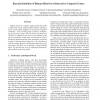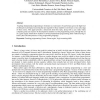212 search results - page 20 / 43 » Learning the task allocation game |
126
Voted
ICPR
2006
IEEE
16 years 2 months ago
2006
IEEE
Modern interactive computer games provide the ability to objectively record complex human behavior, offering a variety of interesting challenges to the pattern-recognition communi...
125
Voted
DIS
2009
Springer
14 years 11 months ago
2009
Springer
In this paper we aim at automatically adjusting the difficulty of computer games by clustering players into different types and supervised prediction of the type from short traces ...
111
Voted
CLEIEJ
2010
14 years 10 months ago
2010
Teaching fundamental programming to freshmen is a hard task to be performed, given the high level action and logical reasoning that are required for these students to develop in a...
137
Voted
UAI
2004
15 years 2 months ago
2004
Exponential models of distributions are widely used in machine learning for classification and modelling. It is well known that they can be interpreted as maximum entropy models u...
123
Voted
AAAI
2008
15 years 3 months ago
2008
This paper examines, by argument, the dynamics of sequences of behavioural choices made, when non-cooperative restricted-memory agents learn in partially observable stochastic gam...


